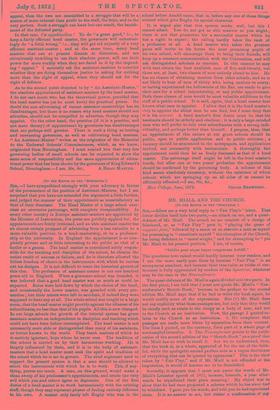[TO THE EDITOR OF THE "SPECTATOR. "]
have sympathised strongly with your advocacy in favour of the permanence of the position of Assistant-Masters, but I am surprised that you have not extended the argument a little further, and judged the manner of their appointment as unsatisfactory as that of their dismissal. The Head Master of a large school exer- oises an enormous patronage, with complete irresponsibility. In every other country in Europe assistant-masters are appointed by the Minister of Instruction, the posts are publicly applied for, the appointments are freely criticised, and an able assistant-master has an almost certain prospect of advancing from a less valuable to a more valuable position, to a head-mastership, or to a professor- ship at the university. In England the appointment is as com- pletely private and as little interesting to the public as that of a butler or a groom. The head master is considered solely respon- sible for the teaching and discipline of the school, he obtains the entire credit of success or failure, and he is therefore allowed the fullest freedom of choice in the instruments with which he carries out his designs. It is not difficult to trace the historical growth of this idea. The profession of assistant-master is not one hundred years old in England. When a grammar-school was founded, it was believed that a good head master was as much as could be expected. Rules were laid down by which the choice of the head, and occasionally the lower master, was guarded with every pre- caution ; but their ushers were left to accident, if indeed they were supposed to have any at all. The whole school was taught in a large room, that the head master might provide against the idleness of his subordinates, no less than that of his pupils. All this is now changed. In our large schools the growth of the tutorial system has given assistant-masters an independence in discipline and teaching which could not have been before contemplated. The head master is not necessarily more able or distinguished than many of his assistants, or better known in the world. They teach matters of which he is entirely ignorant, boys whom he never sees. The tradition of the school is carried on by their harmonious working. Ile is largely influenced by them, and it is in the body of assistant- masters that a head master must seek the spirit and tradition of the school which he is set to govern. The chief argument used to -support the present system is that a man should be allowed to select the instruments with which he is to work. This, if any- thing, proves too much. A man, on this ground, would make a clean sweep of his predecessor's appointments, and create the very evil which you andothers agree to deprecate. One of the first duties of a head master is to work harmoniously with the existing staff, though they may represent phases of feeling entirely different to his own. A master only lately left Rugby who was in the school before Arnold came, that is, before any one of those things existed which give Rugby its special character.
It is urged also that this system works well, but this I cannot admit. You do not get as able masters as you might ; there is not that promotion for a successful master which he has a right to expect ; the calling hardly takes the rank of a profession at all. A head master who takes the greatest pains will invite to his house the most promising pupils of his own school, will encourage them to bring their friends, will keep up a constant communication with the Universities, and will ask distinguished scholars to examine. In this manner he may with tact obtain the best available men of five-and-twenty, but there are, at least, two classes of men entirely closed to him. He has no chance of obtaining masters from other schools, and he is net likely to hear of men of thirty who, being anxious to marry, or having experienced the hollowness of the Bar, are ready to give their ears for a school inspectorship, or any public appointment. Both these classes of men would be most valuable additions to the staff of a public school. It is said, again, that a head master best knows what men to appoint. I allow that it is the head master's duty to appoint the ablest men he can find, but I must deny that it is his interest. A head master's first desire must be that his assistants should be orderly and obedient ; it is only a large-minded man who will prefer to rule over subordinates with a strong indi- viduality, and perhaps better than himself. I propose, then, that an appointment of this nature at our great schools should be public, open to public application and to public criticism ; a vacancy should be announced in the newspapers, and applications invited, not necessarily with testimonials. A thoroughly bad appointment could then be as freely discussed as that of a head master. The patronage itself might be left in the head master's hands, but after one or two years' probation the appointment should be confirmed by the governing body. A scheme of this kind seems absolutely necessary, without the existence of which schools which are springing up on all sides of us cannot be efficiently officered.—I am, Sir, &c.,


































 Previous page
Previous page